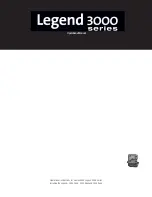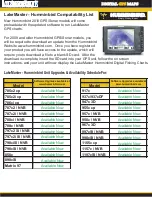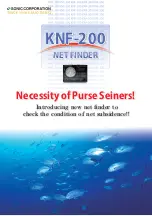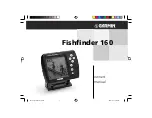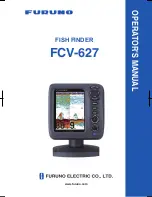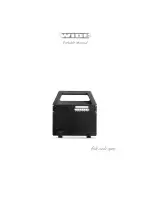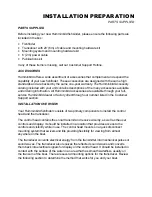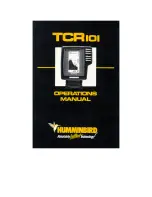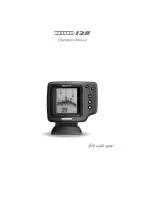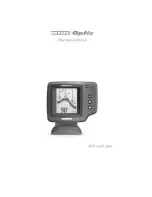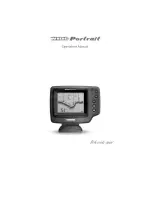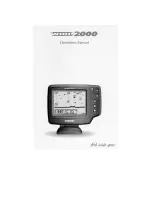
12
different species of fish have different sonar
characteristics, so it is not always possible to
distinguish fish size amongst varying species.
Selecting
F
RESHWATER
will adjust the algorithms toward
freshwater species of fish, while selecting
S
ALTWATER
will
adjust the algorithms towards saltwater species.
Note: The signal intensity is “normalized” for depth so that a
small fish close to the boat will not appear as a large fish
symbol. The digital depth of the designated fish is also shown
to help locate the fish vertically. This is especially helpful in
setting bait depths or for downrigger operation.
The
F
ISH
ID
setting is retained in memory after the
3000
D
EEP
/3005 D
EEP
is turned off. The factory setting is Off.
Simulator
S
IMULATOR
allows the
L
EGEND
3000
S
ERIES
to operate in simulated
sonar mode. This is useful for
learning the features and functionality of the
L
EGEND
3000
S
ERIES
when not on the water. Settings to Control
Panels that are retained in normal operation will be
retained in Simulator Mode if a transducer is
connected. When operating with the Simulator on and
without a transducer connected, the Legend 3000
Series does not remember any changes to settings.
The Simulator setting defaults to factory settings after the
Legend 3000 Series is turned off.
Units
U
NITS
selects the units of
measure for boat speed.
Selecting
KTS
displays the
speed in nautical miles per
hours;
MPH
displays the speed in miles per hour.
U
NITS
selects the units of measure for boat speed and
depth in one of two combinations supported by every
L
EGEND
3000 S
ERIES
:
•
F
EET
/MPH
displays depth in feet and speed in miles
per hour.
•
F
EET
/KTS
DISPLAYS
depth in feet and speed in nautical
miles per hour.
U
NITS
also selects the units of measure for boat speed
and depth in one of four additional combinations
supported by the International Models only:
•
M
ETRES
/KPH
displays depth in metres/speed in
kilometres per hour.
•
M
ETRES
/KTS
displays depth in metres/speed in nautical
miles per hour.
•
F
ATHOMS
/KTS
displays depth in fathoms/speed in
nautical miles per hour.
•
F
ATHOMS
/KPH
displays depth in fathoms/speed in
kilometres per hour.
The
U
NITS
settings are retained in memory after the unit is
turned off.
Language
L
ANGUAGE
(International Models
only) selects the language for
text used in the
C
ONTROL
P
ANELS
and for messages. See the
L
EGEND
3005/3005 D
EEP
Specifications for included
languages.
L
ANGUAGE
setting is retained in memory after the
L
EGEND
3005 /3005 D
EEP
is turned off. The factory setting is
E
NGLISH
.
MAINTENANCE
Your
L
EGEND
3000 S
ERIES
is designed to provide years of
trouble-free operation with virtually no maintenance.
Follow these simple procedures to ensure your
L
EGEND
3000 S
ERIES
continues to deliver top performance.
Cleaning
If the unit comes into contact with salt spray, simply
wipe the affected surfaces with a cloth dampened in
fresh water. Do not use a chemical glass cleaner on
the lens, as chemicals in the solution may crack the
lens.
When cleaning the LCD protective lens, use a
chamois and non-abrasive, mild cleaner. Do not wipe
while dirt or grease is on the lens. Be careful to avoid
scratching the lens.
If your boat remains in the water for long periods of
time, algae and other marine growth can reduce the
effectiveness of the transducer. Periodically clean the
face of the transducer with liquid detergent. Pivoting
the transducer up in the bracket may allow better
access for inspection or cleaning.
Wetting the Transducer
If your boat remains out of the water for a long period
of time, it may take some time to wet the transducer
when returned to the water. Small air bubbles can
cling to the surface of the transducer and interfere
with proper operation. These bubbles dissipate with
time, or you can wipe the face of the transducer with
your fingers after the transducer is in the water.
Heat Damage
Never leave the
L
EGEND
3000 S
ERIES
in a closed car or
trunk—the extremely high temperatures generated in
hot weather can damage the electronics.
MAINTENANCE AND WARRANTY
CONTROL PANELS / MAINTENANCE/TROUBLESHOOTING

